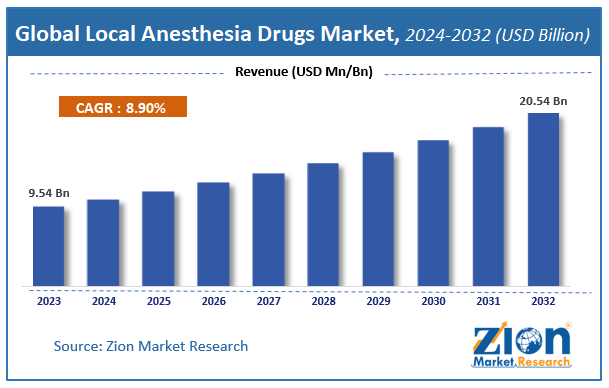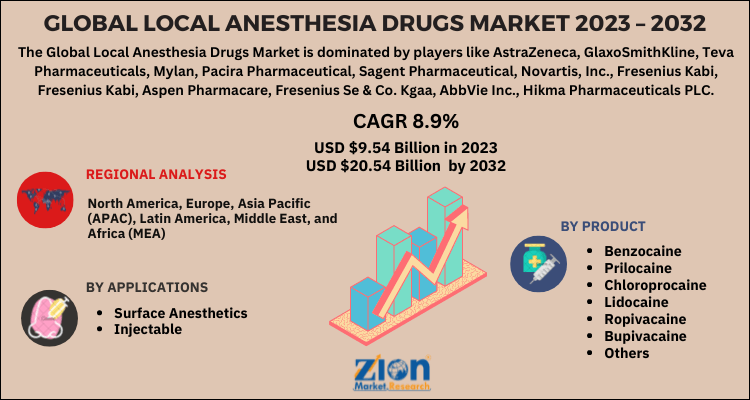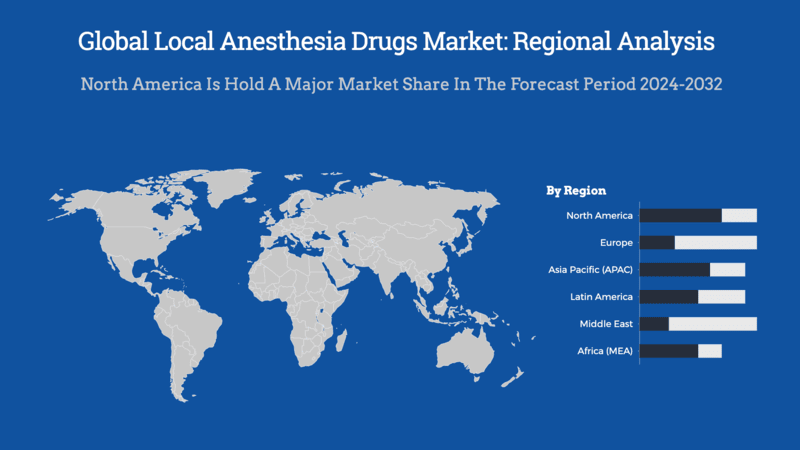Local Anesthesia Drugs Market Size, Share, Growth, and Forecast to 2032

Local Anesthesia Drugs Market By Applications (surface anesthetics and injectable.), By Product (benzocaine, prilocaine, chloroprocaine, lidocaine, ropivacaine, bupivacaine, and others) And By Region:- Global Industry Analysis, Size, Share, Growth, Trends, and Forecast, 2024-2032
| Market Size in 2023 | Market Forecast in 2032 | CAGR (in %) | Base Year |
|---|---|---|---|
| USD 9.54 Billion | USD 20.54 Billion | 8.9% | 2023 |
Description
Local Anesthesia Drugs Market Insights
According to the report published by Zion Market Research, the global Local Anesthesia Drugs Market size was valued at USD 9.54 Billion in 2023 and is predicted to reach USD 20.54 Billion by the end of 2032. The market is expected to grow with a CAGR of 8.9% during the forecast period. The report analyzes the global Local Anesthesia Drugs Market's growth drivers, restraints, and impact on demand during the forecast period. It will also help navigate and explore the arising opportunities in the Local Anesthesia Drugs industry.
Global Local Anesthesia Drugs Market: Overview
Anesthesia is a physical condition where humans lose sensation and awareness of the body. Certain drugs are infused in the body of the patients to bring them in such situation prior to any surgery. Local anesthesia is a temporary situation where any particular part of the human body loses its sensation by the administration of certain drugs into the body for surgeries. Such drugs are given to patients to deal with the painful situation and relieve them from the pain while undergoing some minor or major surgeries. Commonly used aesthetic medicines are beta-adrenoreceptor antagonists, anticonvulsants, and opioid analgesics. The local anesthesia drugs mainly contain a linked carbonyl moiety through a carbon chain to substitute amino groups.
Global Local Anesthesia Drugs Market: Growth Factors
One of the major factors driving the global local anesthesia drugs market is the increasing number of surgical procedures all across the globe including plastic surgeries, cosmetic surgeries, and dental procedures. Moreover, there is a significant rise in the need for pain relief drugs post operation, as many anesthetic drugs are also used as pain killers to relive patient from postoperative pain. The surging number of the aging population and a significant number of demographic population suffering from several chronic diseases like respiratory ailments, cardiovascular disorders, neurological disorders, cancer, gastric diseases, orthopedic, spinal and other problems will also drive market growth.
The advancements and innovations in the drug delivery technologies are expected to propel the demand for local anesthetics in surgical procedures significantly during the forecast period. Moreover, the introduction of effective and innovative drugs like ropivacaine, levobupivacaine, and articaine further boost the growth of the global local anesthesia drugs market. The increasing health expenditure in developing countries like China, Brazil, and India are supporting the growth of the global local anesthesia drugs market by boosting the number of surgeries owing to the growing per capita income of people.
Key Insights
- As per the analysis shared by our research analyst, the global Local Anesthesia Drugs Market is estimated to grow annually at a CAGR of around 8.9% over the forecast period (2024-2032).
- In terms of revenue, the global Local Anesthesia Drugs Market size was valued at around USD 9.54 Billion in 2023 and is projected to reach USD 20.54 Billion by 2032.
- Based on the application, Injectable anesthetics hold the largest market share, accounting for approximately 59.5% in 2023. This dominance is attributed to their extensive use in various surgical procedures.
- Based on the product, Lidocaine is the leading product in the market, commanding a 28.7% share in 2023. Its widespread application as both an injectable and topical anesthetic contributes to its prominence.
- Based on the region, North America leads the global local anesthesia drugs market, with a significant number of surgical procedures performed in the region driving this dominance.
Local Anesthesia Drugs Market: Dynamics
Key Growth Drivers
The local anesthesia drugs market is primarily driven by the increasing number of surgical and dental procedures requiring localized pain management. The growing prevalence of chronic diseases, including cardiovascular and orthopedic conditions, has led to a rise in minor surgeries that rely on local anesthesia. Additionally, advancements in drug formulations, such as long-acting anesthetics and combination drugs, enhance the efficacy and safety of local anesthetics, further propelling market growth. The preference for minimally invasive procedures and outpatient surgeries, which often use local anesthesia instead of general anesthesia, also contributes to market expansion.
Restraints
Despite its growth, the local anesthesia drugs market faces several restraints. Side effects and allergic reactions associated with local anesthetics can limit their use, particularly in patients with sensitivities. The availability of alternative pain management techniques, including regional and general anesthesia, can also reduce the demand for local anesthetic drugs. Furthermore, strict regulatory requirements for drug approval and the high cost of developing novel formulations pose challenges for pharmaceutical companies. Inadequate access to healthcare facilities in low-income regions further restricts the widespread use of local anesthesia drugs.
Opportunities
The growing geriatric population, which is more prone to chronic conditions requiring surgical interventions, presents significant opportunities for the local anesthesia drugs market. Additionally, the increasing adoption of cosmetic and dermatological procedures, such as Botox injections and laser treatments, drives demand for local anesthetics. Innovations in drug delivery systems, including needle-free injectors and topical anesthetics, provide a more comfortable patient experience and expand the application of these drugs. Emerging markets in Asia-Pacific and Latin America, with improving healthcare infrastructure and rising medical tourism, offer further growth potential for manufacturers.
Challenges
One of the key challenges in the local anesthesia drugs market is the risk of adverse effects, including toxicity and nerve damage, particularly when drugs are administered incorrectly. Counterfeit and substandard products circulating in developing regions also pose a significant concern, impacting patient safety and the reputation of legitimate manufacturers. Additionally, the limited availability of skilled healthcare professionals trained in the proper administration of local anesthetics can hinder market growth. Fluctuations in raw material prices and supply chain disruptions may also affect the production and distribution of these drugs, presenting operational challenges for pharmaceutical companies.
Local Anesthesia Drugs Market: Report Scope
| Report Attributes | Report Details |
|---|---|
| Report Name | Local Anesthesia Drugs Market |
| Market Size in 2023 | USD 9.54 Billion |
| Market Forecast in 2032 | USD 20.54 Billion |
| Growth Rate | CAGR of 8.9% |
| Number of Pages | 190 |
| Key Companies Covered | AstraZeneca, GlaxoSmithKline, Teva Pharmaceuticals, Mylan, Pacira Pharmaceutical, Sagent Pharmaceutical, Novartis, Inc., Fresenius Kabi, Fresenius Kabi, Aspen Pharmacare, Fresenius Se & Co. Kgaa, AbbVie Inc., Hikma Pharmaceuticals PLC, F.Hoffmann-La Roche Ltd., Hospira, Inc., Baxter International Inc., Astrazeneca PLC, and Abbott Laboratories |
| Segments Covered | By Application, By Product And By Region |
| Regions Covered | North America, Europe, Asia Pacific (APAC), Latin America, Middle East, and Africa (MEA) |
| Base Year | 2023 |
| Historical Year | 2018 to 2022 |
| Forecast Year | 2024 - 2032 |
| Customization Scope | Avail customized purchase options to meet your exact research needs. Request For Customization |
Global Local Anesthesia Drugs Market: Segmentation
The global local anesthesia drugs market can be segmented into application, product, and region. All the segments have been analyzed based on present and future trends and the market is estimated from 2024 to 2032.
By Applications, the market can be segmented into surface anesthetics and injectable. The injectable anesthesia segment holds the largest share in the global local anesthesia drugs market. The growth can be attributed to the high utilization of injectable anesthetics in surgical procedures all across the globe. Moreover, the surface anesthetics are anticipated to witness huge growth due to the advancements in the drug delivery system.
By Product, the market can be segmented into benzocaine, prilocaine, chloroprocaine, lidocaine, ropivacaine, bupivacaine, and others. The lidocaine segment accounts for the largest share in the global local anesthesia drugs market owing to its high utilization as an injectable and topical anesthetic. Bupivacaine is also anticipated to witness huge growth due to the large number of clinical trials being conducted across the globe to develop this drug. Moreover, the high usage of bupivacaine in post-operative pain management further boosts growth of the segment. Drugs like articaine and ropivacaine are also anticipated to witness growth during the forecast period.
The regional segment includes the current and forecast demand for North America, Europe, Asia Pacific, Latin America, and the Middle East and Africa.
Global Local Anesthesia Drugs Market: Regional Analysis
North America accounts for the largest share in the global local anesthesia drugs market due to the increasing number of surgical procedures in the region. The increasing per capita income of the people and easy access to healthcare facilities along with the growing prevalence of chronic diseases like cancer are further driving the growth of the regional market. The increasing geriatric population in the region is also a primary reason for the growth of the regional market.
The global local anesthesia drugs market demonstrates distinct regional trends influenced by factors such as the prevalence of chronic diseases, aging populations, healthcare infrastructure, and the frequency of surgical procedures.
North America
North America holds a significant share of the local anesthesia drugs market, with a market share of 35.4% in 2023. This dominance is attributed to the high prevalence of chronic diseases, a growing geriatric population, and advanced healthcare infrastructure. In the United States, for instance, the increasing number of surgical procedures, including dental, plastic, and cosmetic surgeries, has driven the demand for local anesthetics. Additionally, heightened awareness of oral hygiene has contributed to market growth.
Europe
Europe is projected to reach a market size of USD 1.27 billion by 2028, growing at a CAGR of 6.51% from 2023. This growth is driven by an increasing number of surgeries, a rising geriatric population, and advancements in treatment processes. Germany leads the European market, with approximately 80% of Germans experiencing oral issues seeking treatment at dental clinics, where local anesthetics are widely used. The United Kingdom also shows notable growth, supported by the rapid adoption of anesthesia drugs in hospitals and the presence of pharmaceutical companies manufacturing these drugs.
Asia-Pacific
The Asia-Pacific region is emerging as a lucrative market for local anesthesia drugs, driven by a rising geriatric population, an increase in chronic diseases, and advancements in surgical procedures. For example, in Japan, more than 1 in 10 people are aged 80 or over, leading to a higher prevalence of chronic diseases and, consequently, an increased number of surgical procedures requiring local anesthetics.
Middle East and Africa
The Middle East and Africa region is anticipated to witness significant growth in the local anesthesia drugs market. Although it currently holds a smaller market share, factors such as growing public awareness, urbanization, lifestyle changes, and an increase in chronic diseases contribute to the rising demand for local anesthesia drugs in this region.
Global Local Anesthesia Drugs Market: Competitive Players
Some of the significant players in the global local anesthesia drugs market are:
- AstraZeneca
- GlaxoSmithKline
- Teva Pharmaceuticals
- Mylan
- Pacira Pharmaceutical
- Sagent Pharmaceutical
- Novartis, Inc.
- Fresenius Kabi
- Aspen Pharmacare
- Fresenius Se & Co. Kgaa
- AbbVie Inc.
- Hikma Pharmaceuticals PLC
- F.Hoffmann-La Roche Ltd.
- Hospira, Inc.
- Baxter International Inc.
- Astrazeneca PLC
- Abbott Laboratories.
Global Local Anesthesia Drugs Market: Segment Analysis
By Applications
- Surface Anesthetics
- Injectable.
By Product
- Benzocaine
- Prilocaine
- Chloroprocaine
- Lidocaine
- Ropivacaine
- Bupivacaine
- Others.
Global Local Anesthesia Drugs Market: Regional Segment Analysis
- North America
- The U.S.
- Canada
- Europe
- France
- The UK
- Spain
- Germany
- Italy
- Rest of Europe
- Asia Pacific
- China
- Japan
- India
- South Korea
- Southeast Asia
- Rest of Asia Pacific
- Latin America
- Brazil
- Mexico
- Rest of Latin America
- Middle East & Africa
- GCC
- South Africa
- Rest of Middle East & Africa
What Reports Provides
- Full in-depth analysis of the parent market
- Important changes in market dynamics
- Segmentation details of the market
- Former, on-going, and projected market analysis in terms of volume and value
- Assessment of niche industry developments
- Market share analysis
- Key strategies of major players
- Emerging segments and regional markets
- Testimonials to companies in order to fortify their foothold in the market.
Table Of Content
FrequentlyAsked Questions
What are the key factors driving local anesthesia drugs market expansion over the forecast timeline?
One of the major factors driving the global local anesthesia drugs market is the increasing number of surgical procedures all across the globe including plastic surgeries, cosmetic surgeries, and dental procedures. Moreover, there is a significant rise in the need for pain relief drugs post operation, as many anesthetic drugs are also used as pain killers to relive patient from postoperative pain.
Some of the significant players in the global local anesthesia drugs market are AstraZeneca, GlaxoSmithKline, Teva Pharmaceuticals, Mylan, Pacira Pharmaceutical, Sagent Pharmaceutical, and Novartis, Inc.
North America accounts for the largest share in the global local anesthesia drugs market due to the increasing number of surgical procedures in the region. The increasing per capita income of the people and easy access to healthcare facilities along with the growing prevalence of chronic diseases like cancer are further driving the growth of the regional market.
HappyClients
Zion Market Research
Tel: +1 (302) 444-0166
USA/Canada Toll Free No.+1 (855) 465-4651
3rd Floor,
Mrunal Paradise, Opp Maharaja Hotel,
Pimple Gurav, Pune 411061,
Maharashtra, India
Phone No +91 7768 006 007, +91 7768 006 008
US OFFICE NO +1 (302) 444-0166
US/CAN TOLL FREE +1 (855) 465-4651
Email: sales@zionmarketresearch.com
We have secured system to process your transaction.
Our support available to help you 24 hours a day, five days a week.
Monday - Friday: 9AM - 6PM
Saturday - Sunday: Closed








